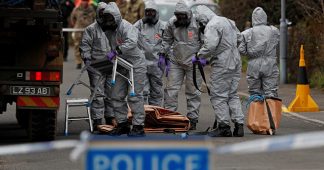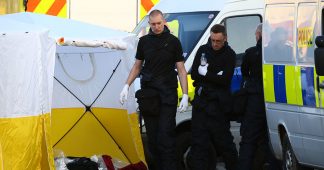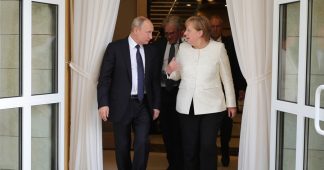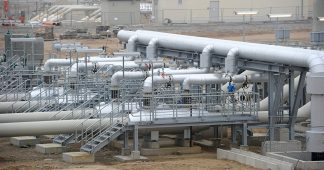10 September 2020
The relationship between Germany and Russia has reached its lowest point since Berlin supported the pro-Western coup in Ukraine six years ago and Russia subsequently annexed the Crimean Peninsula.
The German government is openly accusing the Russian state of poisoning opposition politician Alexei Navalny, who is currently in Berlin’s Charité Clinic. He reportedly awoke from a coma on Monday.
German Chancellor Angela Merkel personally announced at a press conference last week that a chemical weapons laboratory of the Bundeswehr (Armed Forces) had proved “beyond doubt” that Navalny was the victim of an attack using the Novichok nerve agent. She called on the Russian government to answer “very serious questions.”
At a special session of the Parliamentary Control Committee, which meets in secret, representatives of the German government and the secret services left no doubt, according to media reports, that the poisoning of Navalny had been carried out by Russian state authorities, with the approval of the Russian leadership. The poison was said to be a variant of the warfare agent—one even more dangerous than that used in the Skripal case in Britain. It purportedly could enter the body simply through inhalation, and its production and use required skills possessed only by a state actor.
Germany and the European Union are threatening Russia with sanctions. The German government has even questioned the completion of the almost finished Nord Stream 2 natural gas pipeline, which it had categorically defended against pressure from the US and several Eastern European states.
The German media has gone into propaganda mode, repeating the accusations against Russian President Vladimir Putin with a thousand variations. Seventy-nine years after Hitler’s invasion of the Soviet Union, which claimed more than 25 million lives, German journalists and politicians, in editorials, commentaries and on talk shows, speak with the arrogance of people who are already planning the next military campaign against Moscow.
Anyone who expresses doubts or contradicts the official narrative is branded a “conspiracy theorist.” This is what happened to Left Party parliamentarian Sevim Dagdelen, among others, on Sunday evening’s “Anne Will” talk show. The Christian Democratic Union (CDU) foreign policy expert Norbert Röttgen, the head of the Munich Security Conference Wolfang Ischinger and former Green Party Environment Minister Jürgen Trittin sought to outstrip one another in their accusations against the Russian government. When Dagdelen gently pointed out that, so far, no evidence whatsoever has been presented identifying the perpetrators, she was accused of “playing games of confusion” and “encouraging unspeakable conspiracy theories.”
The Russian government denies any responsibility in the Navalny case. It questions whether Navalny was poisoned at all and has called on the German government to “show its cards” and present evidence. Berlin, according to Moscow, is bluffing for dirty political reasons.
Contradictory and implausible
Evidence of the involvement of the Russian state is as contradictory as it is implausible.
For example, the German authorities have so far published no information or handed evidence to Russian investigators identifying the chemical with which Navalny was poisoned. Novichok is merely a generic term for several families of warfare agents.
No explanation has been given as to why no one else showed signs of poisoning from a nerve agent that is fatal even in the tiniest amounts, if touched or inhaled. Navalny had had contact with numerous people between the time he boarded the airplane on which he fainted, his entering the clinic in Omsk where he was first treated, and his transfer to the Charité hospital in Berlin.
This is only one of many unexplained anomalies in the German government’s official story. Career diplomat Frank Elbe, who headed the office of German Foreign Minister Hans-Dietrich Genscher for five years and negotiated the Convention on the Prohibition of Chemical Weapons as head of the German delegation in Geneva from 1983 to 1986, wrote on Facebook on Friday: “I am surprised that the Federal Ministry of Defence concludes that the nerve agent Novichok was used against Navalny.”
Novichok, he wrote, belongs “to the group of super-toxic lethal substances that cause immediate death.” It made no sense, he argued, to modify a nerve poison that was supposed to kill instantly in such a way that it did not kill, but left traces behind allowing its identification as a nerve agent.
There was something strange about this case, Elbe said. “Either the perpetrators—whoever they might be—had a political interest in pointing to the use of nerve gas, or foreign laboratories were jumping to conclusions that are in line with the current general negative attitude towards Russia.”
The assertion that only state actors can handle Novichok is also demonstrably false. The poison was sold in the 1990s for small sums of money to Western secret services and economic criminals, and the latter made use of it. For example, in 1995, the Russian banker Ivan Kiwelidi and his secretary were poisoned with it. The chemist Leonid Rink confessed at the time in court that he had sold quantities to criminals sufficient to kill hundreds of people. Since the binary poisons are very stable, they can last for decades.
The Navalny case is not the reason, but the pretext for a new stage in the escalation of German great power politics and militarism. The media hysteria over Navalny is reminiscent of the Ukrainian crisis of 2014, when the German press glorified a coup d’état carried out by armed fascist militias as a “democratic revolution.”
Social Democrat Frank-Walter Steinmeier, then foreign minister and now German president, personally travelled to Kiev to persuade the pro-Russian president, Viktor Yanukovych, to resign.
He also met with the fascist politician Oleh Tyahnybok, whose Swoboda Party glorifies Nazi collaborators from World War II. Yanukovych’s successor, Petro Poroshenko, one of the country’s richest oligarchs, was even more corrupt than his predecessor. He terrorised his opponents with fascist militias, such as the infamous Azov regiment. But he brought Ukraine into NATO’s sphere of influence, which was the real purpose of the coup.
In the weeks before the Ukrainian coup, leading German politicians (including then-President Joachim Gauck and Steinmeier) had announced a far-reaching reorientation of German foreign policy. The country was too big “to comment on world politics from the sidelines,” they declared. Germany had to defend its global interests, including by military means.
NATO marched steadily eastward into Eastern Europe, breaking the agreements made at the time of German reunification in 1990. For the first time since 1945, German soldiers today patrol the border with Russia. With Ukraine’s shift into the Western camp, Belarus is the only remaining buffer country between Russia and NATO.
Berlin now sees the protests against the Belarusian dictator Alexander Lukashenko as an opportunity to remove this hurdle as well. Unlike in Ukraine, where anti-Russian nationalists exerted considerable influence, especially in the west of the country, such forces are weaker in Belarus, where the majority speaks Russian. The working class is playing a greater role in the resistance to the Lukashenko regime than it did in Ukraine. But Berlin is making targeted efforts to steer the movement in a pro-Western direction. Forces that appeal for Western support, such as the presidential candidate Svetlana Tikhanovskaya, are being promoted.
Dispute over Nord Stream 2
The dispute over the construction of the Nord Stream 2 pipeline, whose discontinuation is being demanded by more and more German politicians, must also be seen in this context. It was a strategic project from the very beginning.
The natural gas pipeline, which will double the capacity of Nord Stream 1, which began operations in 2011, will make Germany independent of the pipelines that run through Ukraine, Poland and Belarus. These countries not only earn transit fees from the pipelines but have also used then as a political lever.
With a total capacity of 110 billion cubic metres per year, Nord Stream 1 and 2 together would carry almost all of Germany’s annual gas imports. However, the gas is also to be transported from the German Baltic Sea coast to other countries.
In addition to Russia’s Gazprom, German, Austrian, French and Dutch energy companies are participating in the financing of the project, which will cost almost €10 billion. The chairman of the board of directors is former German Chancellor Gerhard Schröder (Social Democratic Party), who is a friend of President Putin.
Nord Stream 2 is meeting with fierce opposition in Eastern Europe and the US. These countries fear a strategic alliance between Berlin and Moscow. In December of last year, the US Congress passed a law imposing severe sanctions on companies involved in the construction of the pipeline—an unprecedented move against nominal allies. The nearly completed construction came to a standstill because the company operating the special ship for laying the pipes withdrew. Berlin and Moscow protested vehemently against the US sanctions and agreed to continue construction with Russian ships, which, however, will not be available until next year at the earliest.
Excerpt of an article by Peter Schwarz published by wsws.org










